 Download this article in magazine layout
Download this article in magazine layout
- Share this article
- Subscribe to our newsletter
You can change the game
Especially those actors in development cooperation with a strong and impactful track record will ask why they should change their existing modes of operation. But many achievements from the last decades are jeopardised. The hunger curve is moving up again, environmental degradation is getting out of control, while social and economic inequalities and conflicts are increasing in many countries. Core framework conditions are changing rapidly, and traditional methods and technologies to fight hunger and poverty are reaching their limits.
Climate change poses an unprecedented challenge to all humankind, affecting the most vulnerable first and hardest. It is a disruptor that requires disruptive reactions – faster and more innovative. Globalisation in combination with a growing world population is putting resources under pressure. Armed conflicts and crises are becoming super-regional. Fragmented answers do not suffice anymore. And finally, digitalisation is triggering new dynamics incredibly fast. Concerns over data protection and a “digital divide” between North and South – and within the developing societies – are rising. On the other hand, digitalisation provides opportunities such as access to markets and information, social mobilisation and transparency in the policy sector. Mechanisms of technical and financial assistance are not keeping the promise to create global justice. Communities in the Global South more than ever demand true eye-level cooperation and empowerment. And, especially younger generations in many countries of the Global North share this perspective.
“Innovate or die” is a known mantra in the business world. As it seems, it is becoming more and more relevant for development cooperation, too. The effectiveness of our sector will depend on our ability to strengthen our innovative capabilities. The present situation is:
- New opportunities for impact are not identified systematically.
- Sometimes ideas for great solutions are found, but they cannot grow for lack of support – financial resources, expertise and partnerships are not available.
- If a great solution for impact is developed, it often does not unfold the impact it could have as it is not scaled for maximum impact.
But innovation is not just an answer to a changing framework and to a desire for greater effectiveness. An increasing number of organisations understand innovation inherently as an opportunity to transform themselves and their working cultures. Looking at the leading business companies from the 1970s, how many of them have prevailed? Only very few, and only those that have managed to reinvent themselves permanently. And only those that were ready to enter new fields of action at the right moment.
Boosting digital innovations
Providing digital solutions poses such a promising innovative field of action in development cooperation. This can, for example, be products or services for market linkages, learning and information sharing platforms, tools for increased process efficiency or digital financial services. Scaling digital products is relatively easy, and transfer from one country to another is simple and considerably economical, if cultural and geographic differences as well as the context are understood. They can create good value for the users through simpler, faster and cheaper processes, new forms of social organisation and better access to networks, markets and information.
While the opportunities for digital apps in the Global North show signs of saturation, digital market gaps exist in the Global South. The Bottom of the Pyramid is either no interesting customer group for big tech firms or entry in these new markets has been significantly more challenging to them than they expected. This provides an opportunity for local tech start-ups and entrepreneurs in the Global South who are ready to catch up.
There are well proven concepts to identify powerful and, at the same time, profitable ideas. Take, for example, “innovation challenges” – a clear process to find new solutions to problems. It starts with the step of wide ideation, leading to a selection of the best ideas, testing them in simple prototypes and finally selecting and supporting the most promising concepts in order to turn them into a functioning product version. This process can be an inclusive and open invitation for grassroot innovators who might not even have thought of themselves as potential entrepreneurs. But lack of access to funding and technical support often disempowers the local actors. Financing, but also expertise in methodologies, building digital ventures, IT-skills and business planning are needed.
However, the uncertain success of new ideas often keeps supporters away. The formulation of stage gates, clear milestones that must be achieved for each step in the incubation process, can mitigate the risk. If an idea turns out to fail, it must be adjusted or abandoned quickly. This is the case for the majority of ideas, and is nothing bad. On the contrary, holding on to a weak idea would take resources from a potentially stronger one.
Finally, if a digital idea can be turned into a Minimum Viable Product (MVP), a very basic version that possesses the most essential product features, developing it further and scaling it up can produce great impact. Digital solutions can be easily equipped with additional functionalities and multiplied. Economic sustainability as well as the ownership and the use of data are important questions. An open-source policy should be a standard for greatest impact while the protection of user data must be guaranteed according to the highest standards.
Working in business formats
Social businesses are another growing field of action. For many years, businesses and philanthropic projects have been perceived as contrary worlds. And still, merging the good parts of both bears new opportunities for much bigger and long-lasting impact. Social businesses are rapidly gaining importance as a compliment for classic grant-based philanthropic projects. Although still not a very much tested and established format, social businesses are more than a trend. They are an opportunity to give the content of development cooperation a fundamentally new standard format.
Being businesses, they must be needs-oriented by nature, offering products or services that meet sufficient demand from their target groups. If they grow to a self-sustaining maturity level with the right governance structure in place, they can be both profitable and impactful.
Social businesses are not limited in terms of time and will adjust their offerings permanently to changing customer demand. Ideally, the businesses expand over time, scale and multiply their impact. They create local jobs and can have strong positive effects on local value chain creation. To survive, their offerings must stay relevant and qualitatively so good that they can compete with others. But these advantages must be weighed against the risks.
Obviously, establish a business is a complex challenge which is full of uncertainties. Many businesses fail in the first years, and invested money and work is lost. Certain prerequisites must be in place to create a successful social business. Amongst others, a good business case, sufficient start-up funding, access to markets, the right business partners and, most of all, a strong entrepreneurial business team are crucial factors for success.
What does it take?
Ultimately, innovation is much bigger than digital solutions and social businesses. It comprises physical innovations and non-for-profit solutions as well as a set of methodologies, and finally, it is a mind-set, too. Digital products and social businesses are just two examples of new ways to fight hunger and poverty. Some key ingredients can help to enter these fields:
Be agile: Using agile principles and methodologies can make our work more effective, interactive and creative. Many agile methods come from the IT and business world but can easily be adapted to classic project management. Transparent and flexible collaboration helps to adjust actions flexibly, instead of pulling through plans. The Scrum Methodology for product and project management is a good example of an excellent format that allows people from various parts of an organisation and external participants to work and co-create together.
Put the customer in the focus: Participation of target groups is a prerequisite for sustainability. It is an additional step to perceive the people we work with as self-determined “customers” and not as “beneficiaries”. This has a truly liberating and empowering effect. Co-designing together with and for these customers creates real value. They have the freedom to demand and choose the best offerings. Proximity to customers is a decisive advantage in idea generation. User-centric design of apps or sales channels for impact products are good examples.
Act in partnerships: Multi-sector partnerships are crucial to scale social innovation. Innovative projects and social businesses are a perfect platform to bring diverse partners together from science, the private sector and impact-driven organisations. Each can contribute with its own set of resources and networks. Innovation is an opportunity to overcome traditional silos, to share insights and to join forces to achieve common goals.
Overcome cultural orthodoxies: Business approaches and even businesses terminologies have left a bitter taste among many impact driven agencies. Neo-capitalistic excesses have manifested a perception that “social” and “business” are contrary poles. But businesses hold the power to create sustainable impact and value for customers, and not only profit and shareholder value. However, the only way to make this evident will be through providing concrete proof.
Have courage: Change is the objective of Development Cooperation, but stability is a dominant feature of its culture. Its eco-system is built on carefulness and caution and tends to replicate proven solutions – for good reasons. As a result, the courage to try out new things, including the possibility to fail, is not strongly incentivised. Creating room to experiment and a culture where failure is not punished but learnt from will be a core task for the leaders in charge.
It takes courage to invest sweat and tears, money and other resources into something without knowing whether it will work. But it can change the world if even one out of a dozen experiments succeeds. Using our innovative potentials for maximum impact is a challenging and yet promising call to all of us.
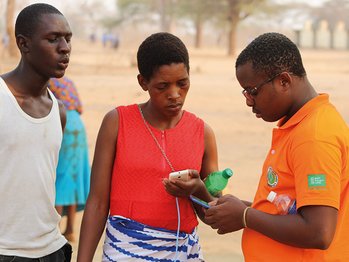
AGRISHARE – BRIDGING A MARKET GAP IN AGRI TOOLS ACCESS
In many African countries, smallholder farmers lack access to necessary productive and transport machinery. Together with local partners in Zimbabwe, Welthungerhilfe has developed AgriShare, a digital platform for agricultural machinery. Bigger farms can rent out their tractors, lorries or other equipment to smallholder farmers or farmer groups. Food production and supply in the region have improved, and both sides benefit economically. The app was tested in Zimbabwe and is currently rolled-out to Uganda. It will be managed in local social businesses to guarantee economic sustainability.
https://www.agrishare.app
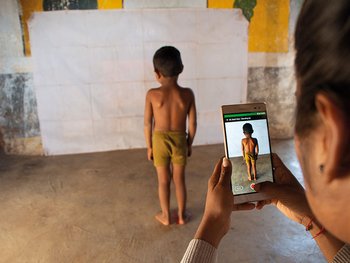
CHILD GROWTH MONITOR – A DIGITAL GAME-CHANGER IN THE DETECTION OF UNDERNUTRITION AND MALNUTRITION
Measuring children in order to detect malnutrition in all its forms is a physically difficult and costly process that involves scales, measuring boards and, often, middle upper arm circumference (MUAC) tapes. The results of the manual measuring processes are often inaccurate, and millions of children are never measured. Children often do not get the health and life-saving treatment they need. The Child Growth Monitor was born as idea in Welthungerhilfe's first innovation challenge to find new approaches in the fight for zero hunger in 2017. It is an app that turns mobile phones into child scanning devices by using artificial intelligence and virtual reality. A 15-person tech team has been formed and is currently preparing the release of the first product version. Many partners from science, the non-profit world, tech companies and other private sector partners have joined this quest. The first product version of the app is designed for use by health care workers. It will enable them to detect the nutrition problems of millions of hildren to safeguard their health and save lives.
https://childgrowthmonitor.org
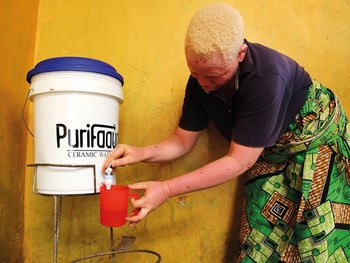
SPOUTS OF WATER – JOINING FORCES FOR GREATER REACH
Unsafe drinking water has major negative health, economic and social effects for Ugandans. The Ugandan company Spouts of Water (founded 2014) is responding to these problems with the production of a locally manufactured Purifayaa ceramic water filter, which effectively takes out 99.99 per cent of bacteria. Since inception, Spouts of Water has distributed over 62,000 Purifaaya filters providing more than 375,000 end-users with long-term access to safe and clean drinking water. Welthungerhilfe started to cooperate with the business in 2019 to bring the product to new rural customer groups and support it on its path to broad impact creation.
https://spouts.org
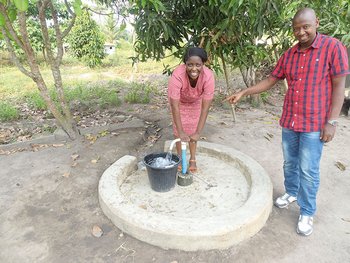
WASAP – FROM PROJECT TO BUSINESS
Hygiene facilities such as showers, sinks, toilets or wells are unaffordable for many people in Sierra Leone, causing strong negative health and economic effects for the populations. Together with Emas International, a German-based association that promotes simple technologies for safe drinking water access, and a local entrepreneur, Welthungerhilfe has turned a former NGO project on affordable low-tech WASH (Water, Sanitation & Hygiene) solutions into a local low-tech start-up. The Water Sanitation Promotion Company Limited (Wasap) was established in February 2020 and is now selling affordable products to poor customer segments in the country, including DIY (Do It Yourself) instructions and maintenance support.
www.wasap.life
SOCIAL BUSINESSES AT WELTHUNGERHILFE
The German NGO Welthungerhilfe started to engage in social businesses in 2017. Today, the organisation is financially and operationally involved in five different purpose-driven companies in Africa which provide products and services that are designed and directed to vulnerable customer groups. Partly, these businesses have developed from own successful not-for-profit projects. In other cases, Welthungerhilfe is joining forces with already existing social businesses and supporting them with its operative structures, expertise in the rural context and markets. Also, most of its own digital products are meant to be managed in social businesses to guarantee their economic sustainability. All businesses have their own local executive management, while Welthungerhilfe is engaged in the Supervisory Boards.
Florian Landorff is Head of Innovation at the German NGO Welthungerhilfe in Bonn, Germany.
Franziska Kerting is Head of Project for Digital Innovations at Welthungerhilfe.
Contact: florian.landorff@welthungerhilfe.de


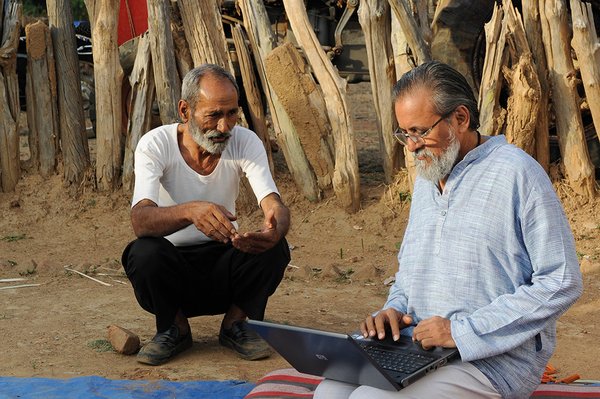


Add a comment
Be the First to Comment